Serving 489 students in grades 6-8, Lokelani Intermediate School ranks in the bottom 50% of all schools in Hawaii for overall test scores (math proficiency is bottom 50%, and reading proficiency is bottom 50%).
The percentage of students achieving proficiency in math is 26% (which is lower than the Hawaii state average of 38%). The percentage of students achieving proficiency in reading/language arts is 43% (which is lower than the Hawaii state average of 52%).
The student:teacher ratio of 19:1 is higher than the Hawaii state level of 14:1.
Minority enrollment is 81% of the student body (majority Hispanic), which is lower than the Hawaii state average of 89% (majority Asian and Hispanic).
Quick Stats (2025)
- Grades: 6-8
- Enrollment: 489 students
- Student:Teacher Ratio: 19:1
- Minority Enrollment: 81%
- Overall Testing Rank: Bottom 50% in HI
- Math Proficiency: 26% (Btm 50%)
- Reading Proficiency: 43% (Btm 50%)
- Science Proficiency: 30-34% (Btm 50%)
- Source: National Center for Education Statistics (NCES), HI Dept. of Education
Top Rankings
Lokelani Intermediate School ranks among the top 20% of public schools in Hawaii for:
Category
Attribute
Diversity
School Overview
Lokelani Intermediate School's student population of 489 students has declined by 11% over five school years.
The teacher population of 26 teachers has declined by 33% over five school years.
Grades Offered
Grades 6-8
Total Students
489 students
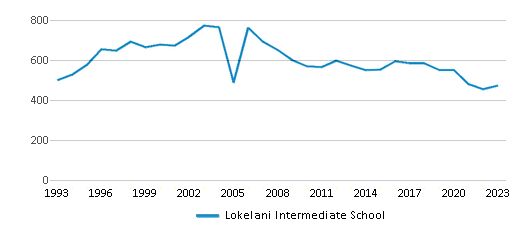
Gender %
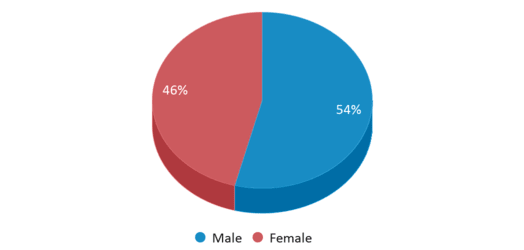
Total Classroom Teachers
26 teachers
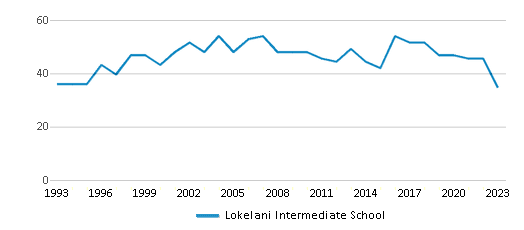
Students by Grade
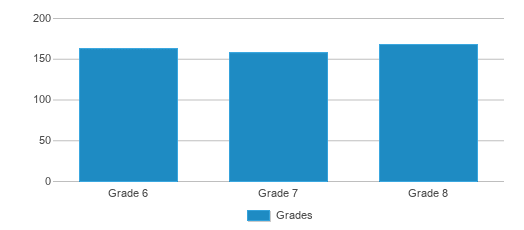
School Rankings
Lokelani Intermediate School ranks within the bottom 50% of all 292 schools in Hawaii (based off of combined math and reading proficiency testing data).
The diversity score of Lokelani Intermediate School is 0.79, which is less than the diversity score at state average of 0.80. The school's diversity has stayed relatively flat over five school years.
Overall Testing Rank
#206 out of 292 schools
(Bottom 50%)
(Bottom 50%)
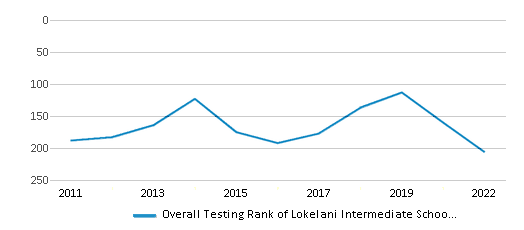
Math Test Scores (% Proficient)
26%
38%
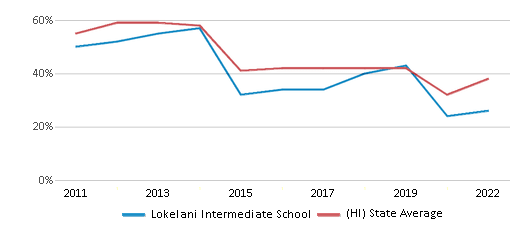
Reading/Language Arts Test Scores (% Proficient)
43%
52%
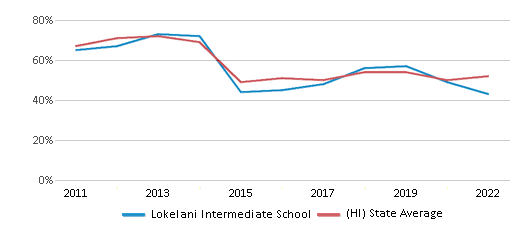
Science Test Scores (% Proficient)
30-34%
40%
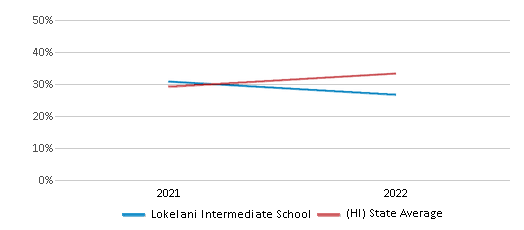
Student : Teacher Ratio
19:1
14:1
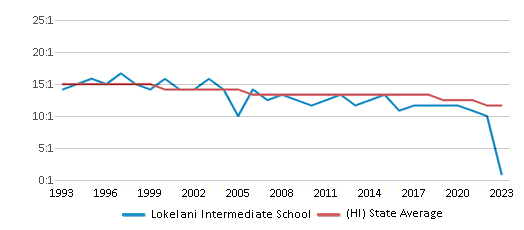
American Indian
n/a
n/a
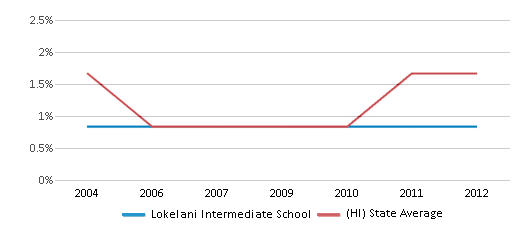
Asian
21%
24%
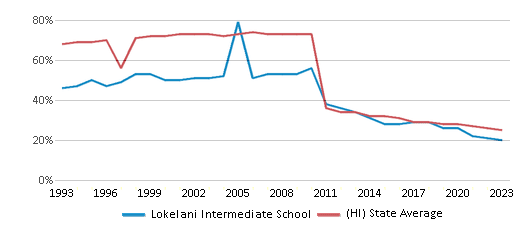
Hispanic
29%
19%
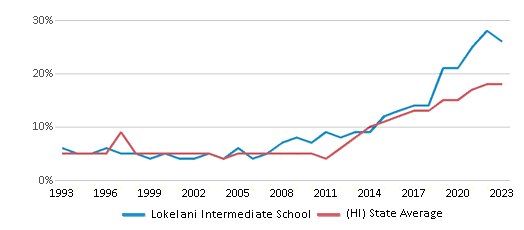
Black
n/a
1%
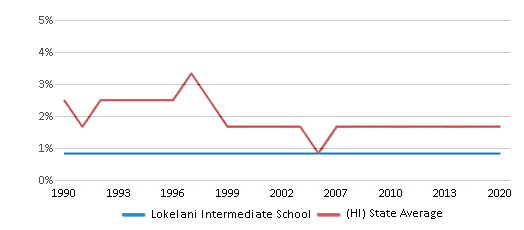
White
19%
11%
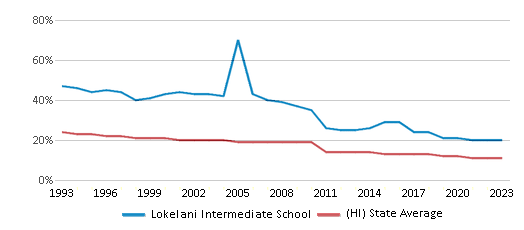
Hawaiian
13%
25%
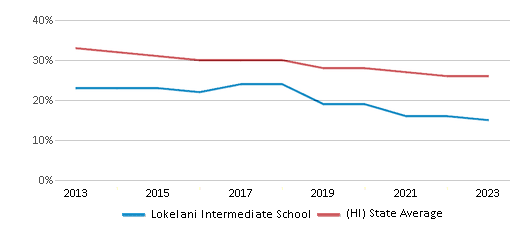
Two or more races
18%
20%
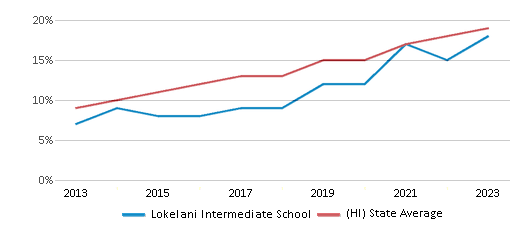
All Ethnic Groups
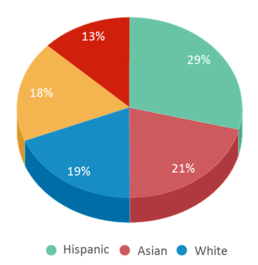
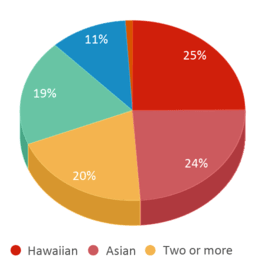
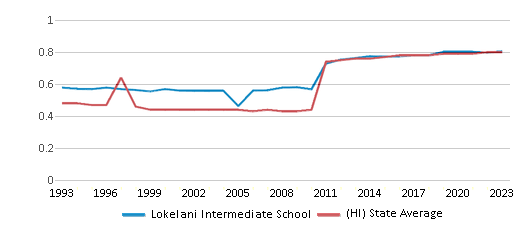
Participates in the National School Lunch Program (NSLP)
Yes
Eligible for Free Lunch
41%
37%
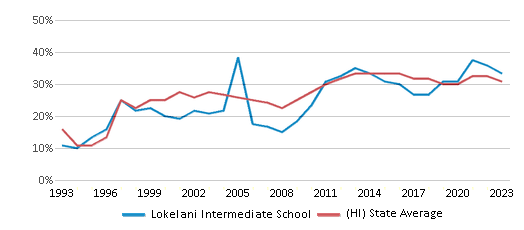
Eligible for Reduced Lunch
10%
9%
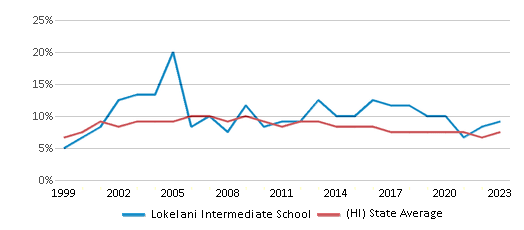
School Statewide Testing
School District Name
Source: National Center for Education Statistics (NCES), HI Dept. of Education
Profile last updated: 02/09/2025
Frequently Asked Questions
What is Lokelani Intermediate School's ranking?
Lokelani Intermediate School is ranked #206 out of 292 schools, which ranks it among the bottom 50% of public schools in Hawaii.
What schools are Lokelani Intermediate School often compared to?
Lokelani Intermediate Schoolis often viewed alongside schools like Kihei Charter School, Maui Waena Intermediate School by visitors of our site.
What percent of students have achieved state testing proficiency in math and reading?
26% of students have achieved math proficiency (compared to the 38% HI state average), while 43% of students have achieved reading proficiency (compared to the 52% HI state average).
How many students attend Lokelani Intermediate School?
489 students attend Lokelani Intermediate School.
What is the racial composition of the student body?
29% of Lokelani Intermediate School students are Hispanic, 21% of students are Asian, 19% of students are White, 18% of students are Two or more races, and 13% of students are Hawaiian.
What is the student:teacher ratio of Lokelani Intermediate School?
Lokelani Intermediate School has a student ration of 19:1, which is higher than the Hawaii state average of 14:1.
What grades does Lokelani Intermediate School offer ?
Lokelani Intermediate School offers enrollment in grades 6-8
What school district is Lokelani Intermediate School part of?
Lokelani Intermediate School is part of Hawaii Department Of Education School District.
School Reviews
5 10/29/2016
I love this school because the teachers are nice and helpful and they teach me a lot
5 1/31/2011
My daughter attends 8th grade and we are very happy with the education and opportunities that are available. There is the opportunity for advanced classes and to participate in state/national programs (writing, history, art, etc.) The Principal is very accessible and well-respected by students, teachers and parents. The facilities are adequate -- it would be nice if Hawaii spent more money at the local level of facilities and teachers. There are many opportunities for parents to be involved which are communicated by a monthly newsletter and posters at the school -- a parent can be involved as much as they want to be.
2 5/31/2010
The academic awards are not held very well. There aren't any school teams to play in, the parents are left in the dark about everything, along with many students. The staff is not good, save a few teachers. Disciplinary action is not dealt with well. The facilities are filthy, and only some rooms have air conditioning so it is extremely hot. This is a truely horrible school, and I would never send a child a care about here.
Review Lokelani Intermediate School. Reviews should be a few sentences in length. Please include any comments on:
- Quality of academic programs, teachers, and facilities
- Availability of music, art, sports and other extracurricular activities
Recent Articles

What Is A Charter School?
Explore the world of charter schools in this comprehensive guide. Learn about their history, how they operate, and the pros and cons of this educational innovation. Discover key facts about charter schools, including admission policies, demographics, and funding, as well as what to look for when considering a charter school for your child.

10 Reasons Why High School Sports Benefit Students
Discover the 10 compelling reasons why high school sports are beneficial for students. This comprehensive article explores how athletics enhance academic performance, foster personal growth, and develop crucial life skills. From improved fitness and time management to leadership development and community representation, learn why participating in high school sports can be a game-changer for students' overall success and well-being.

February 05, 2025
Understanding the U.S. Department of Education: Structure, Impact, and EvolutionWe explore how the Department of Education shapes American education, from its cabinet-level leadership to its impact on millions of students, written for general audiences seeking clarity on this vital institution.









